Family-owned and run Qorokwe, on a private concession bordering the renowned Moremi Game Reserve in the south-eastern Okavango Delta, is generally action-packed. Wildlife sightings often mean high drama: predators fiercely on the hunt or battling each other over a kill. Sometimes they’re nearby, and relatively chilled.
‘There’s days where the guides and guests will see thirty lions, seven cheetah, and the wild dogs will come into camp’, says Cobus Calitz, the camp’s General Manager.
Meaning 'the place where the buffalo broke through the bush into the water', Qorokwe was built by the Calitz family on the 26 180-hectare concession, one of the Delta's high-density game areas.
‘The Qorokwe concession is defined by the Gomoti Channel in the east, while a large part of it lies across the Santantadibe River to the west’, Cobus says. ‘This variety of habitats, plus the fact that the concession has permanent water all year round, allows for a unique diversity of wildlife and birds. The camp itself overlooks a lagoon which is a magnet for wildlife’.
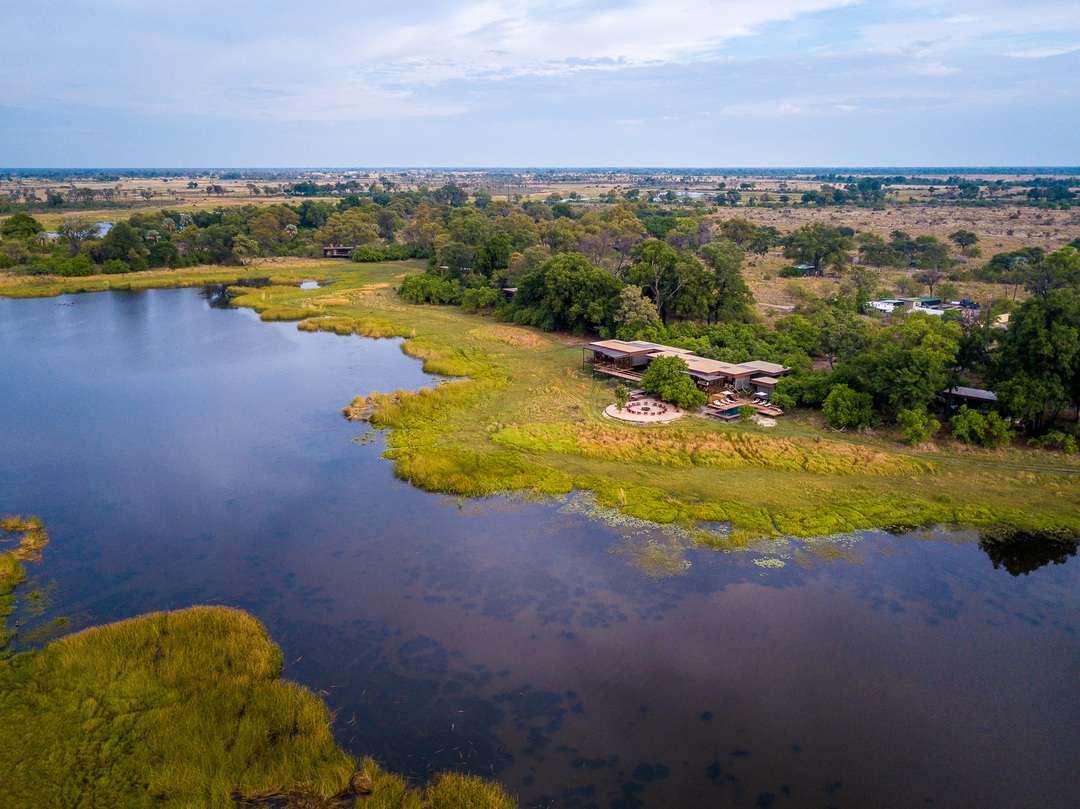
Offering luxurious, contemporary eco-chic in a spectacular setting, a landscape ranging from floodplains to acacia woodlands and palm-dotted islands, Qorokwe boasts large concentrations of predators such as lion, leopard, spotted hyaena, cheetah, and wild dog, as well as herbivores such as elephant, giraffe, buffalo, and a range of antelope, including the rarer red lechwe and tsessebe.
‘Guests coming to Africa for the first time sometimes get upset witnessing a kill’, Cobus says. ‘The guides usually move away if so. But photographers who come are keen for the action’.
Partnered with Wilderness Safaris since it opened in December 2017, Qorokwe remains full of surprises, of exceptional wildlife encounters and a wide choice of activities. As the warm and welcoming Qorokwe team – Cobus, his wife Jil and the rest of the staff – attest…
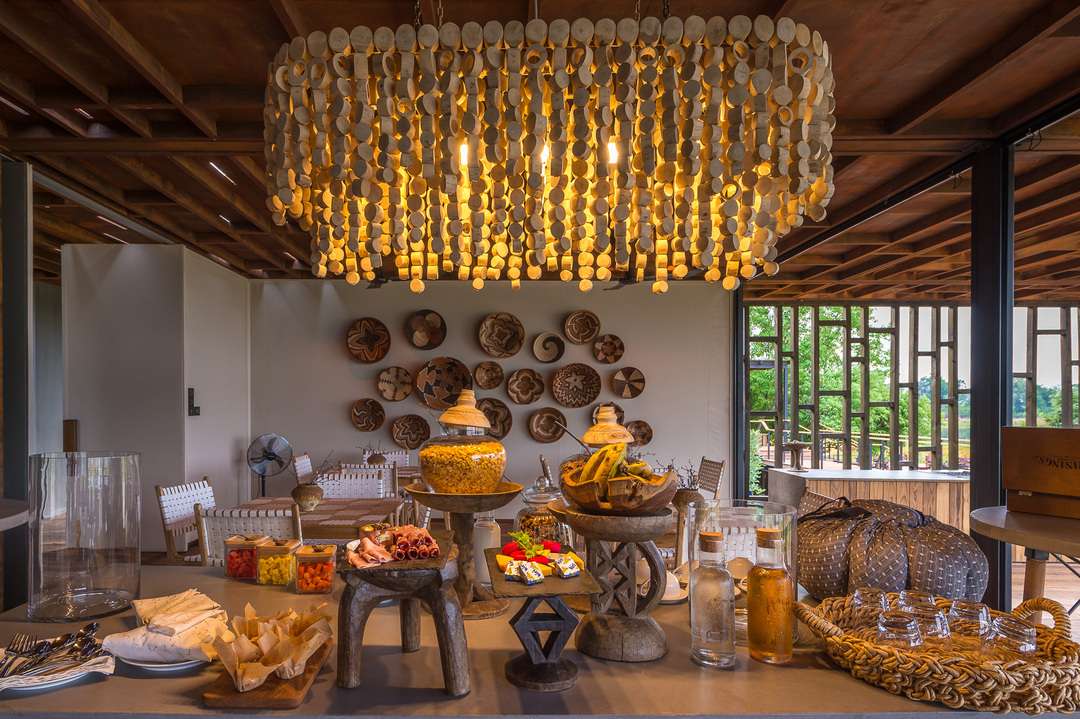
What is the history of Qorokwe, and how did your partnership with Wilderness Safaris come about?
(Cobus) As with many of the successful photographic safari areas today in the Okavango Delta, the same applies for the land use plan for NG32 – the private concession where we operate Qorokwe. Historically, the rights were that of multi-purpose use. Because of the location of the area – in one of the most game-rich areas of the Delta – the land use plan was changed to single use or non-consumptive, much more suited to the high-end, low-impact model we’ve been following.
After we, the Calitz family, secured the lease tenure for Qorokwe, we sought the best company to market and represent our unique high-end product. Having been friends with key individuals within Wilderness Safaris for some time, it was an easy decision as to whom to choose to partner with us and build the Qorokwe name.
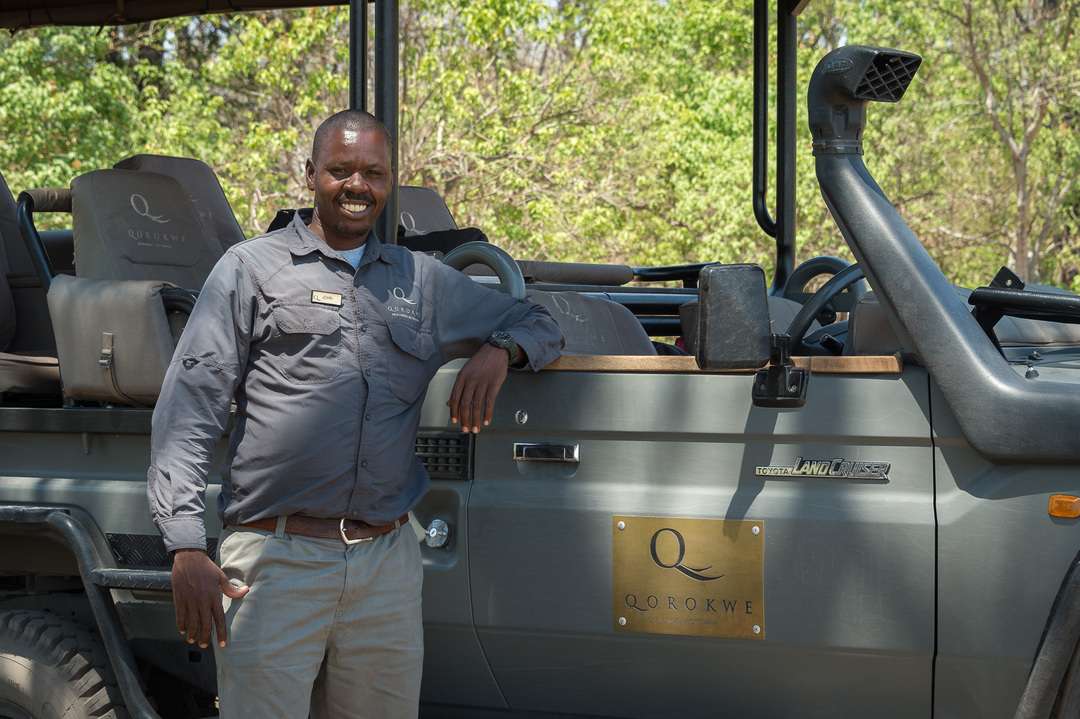
What are the activities/services offered at Qorokwe, and what are the highlights of a stay there, the aspects that guests really seem to love?
(Cobus) Qorokwe is located on a private concession, which means we have more freedom in our activities than you generally would in a national park. With night drives, for instance: we take guests out to spot nocturnal animals that aren’t normally seen on safari. We offer guided walks, which provide a completely new perspective on wildlife when encountering some of the bigger species. One of the highlights at Qorokwe is to experience a ride in a mokoro, a traditional dugout canoe. Quiet and tranquil, you get to enjoy the closeness of nature being at the water’s edge. There you get to encounter everything from the smallest reed frogs to the big old elephant bulls feeding in the waterways.
We offer game drives with some of the best wildlife sightings that the Okavango Delta has to offer. The concession area has two permanent rivers to the east and west of the camp, thus offering water activities year round – even though Qorokwe is a land-based camp. We offer boating, but this activity is limited to the seasonal inundation.
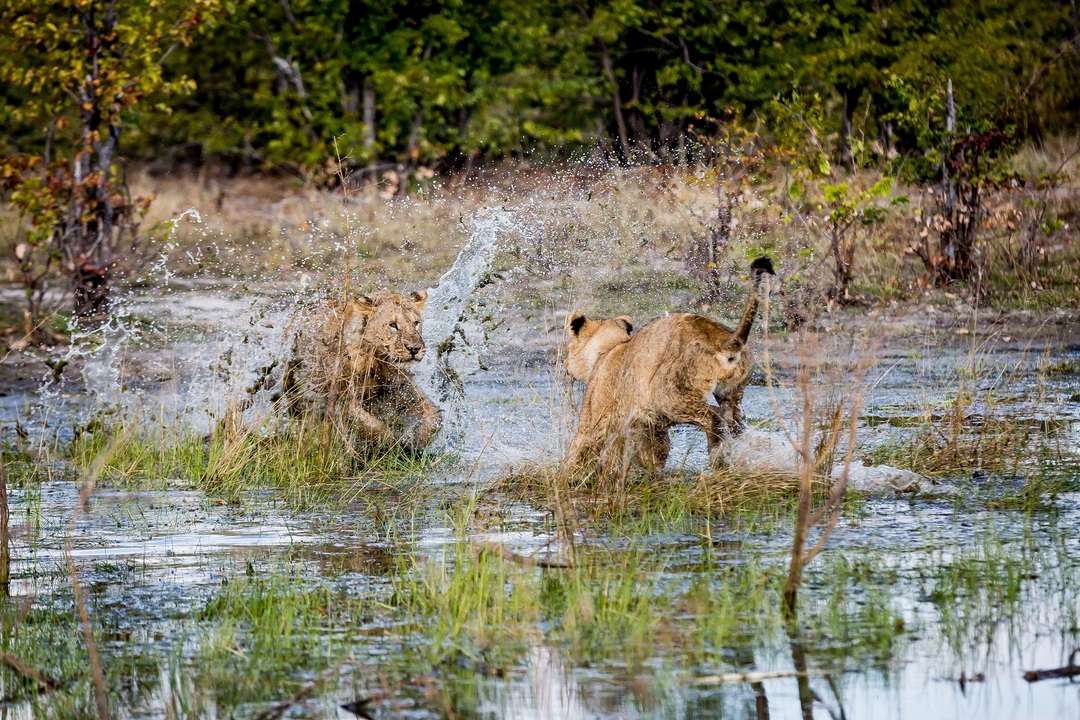
We take guests on day trips to one of the local villages within the NG32 community, and on excursions to the Gomoti Channel, topped off with a wonderful picnic set up in the bush overlooking the bordering Moremi Game Reserve.
What do YOU most love about Qorokwe?
(Cobus) The location of the camp for one, and its whole design and interior feel. And the friendly staff – who make every stay at Qorokwe memorable.
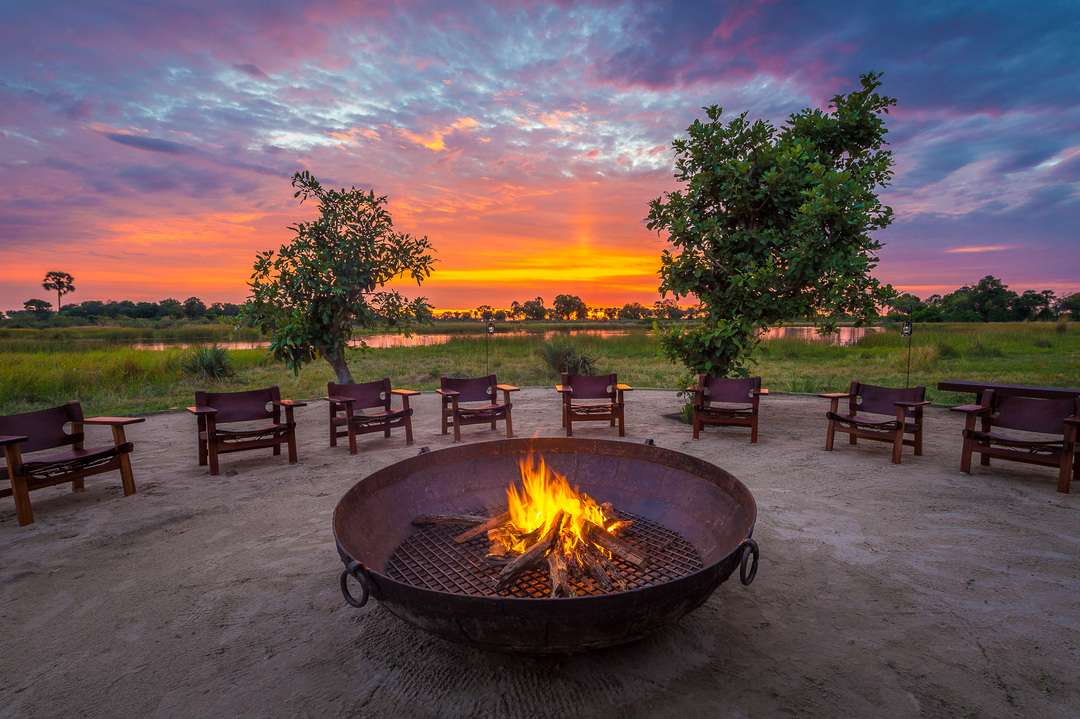
Please talk about the wildlife at/around the camp. What are/have been some of the most ‘wow’ sightings/experiences?
(Allan) The Gomoti floodplains are one of the most fertile areas in the Qorokwe concession, offering an incredibly diverse congregation of herbivores. There’s often a lot of drama there. One day we were out with guests, watching a group of impala drinking at a waterhole, when suddenly wild dogs came out of nowhere, scattering the impalas. Except for one, that was caught by a crocodile in the water. We didn’t know where to move, whether to follow the dogs or to stare at the waterhole, watching the impala fighting for its life. One of the dogs started pulling the impala from the waterhole, and then hyaena came in and took over from the dog and the dog ran away. It was amazing, a like a tug-of-war. Within two to three minutes the impala was torn apart, 90% of it taken by the hyaena. the crocodile disappeared with its own little chunk of meat and the hyaena fed on the rest. Some of the guests were crying – but nature is unbelievable.
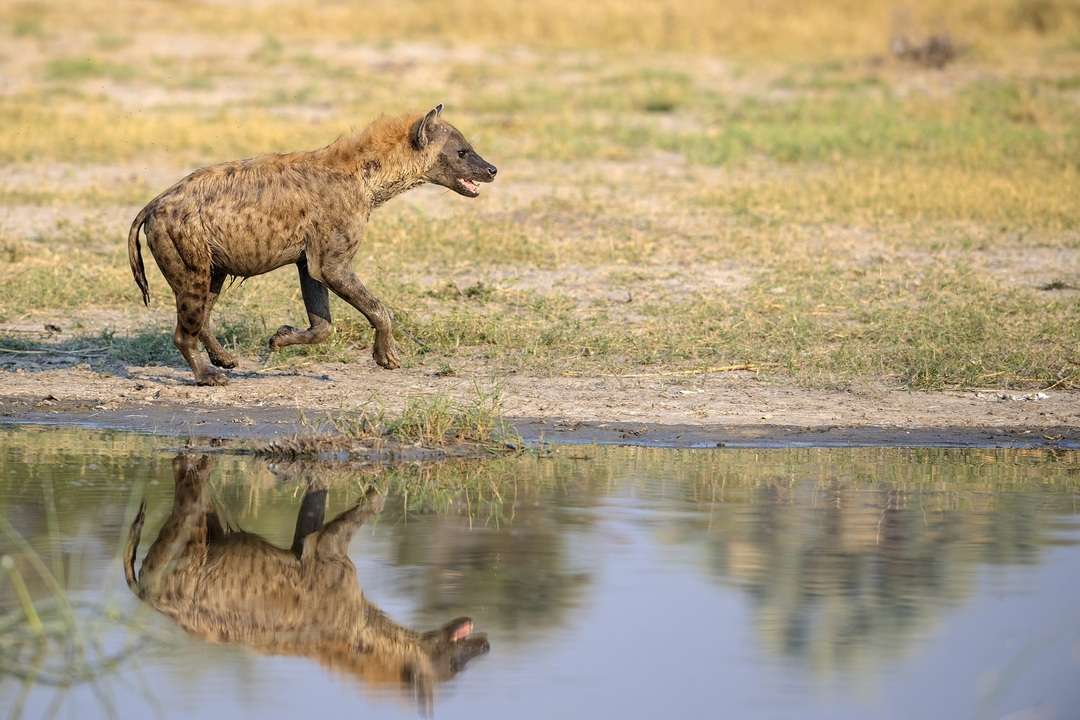
(Tshabo) After a day out to the Gomoti River, where we witnessed a spectacular river crossing of about 200 elephants in breeding herds, we were driving back to camp and saw a cloud of dust rising close to the riverbank. We drove closer, and found a female cheetah holding a wildebeest down to the ground; with jaws firmly clasped around the throat, the cheetah suffocated her prey. Three cheetah cubs soon joined their mother and all fed from the carcass. At this point, a large troop of chacma baboons arrived, and after much barking chased the cheetahs away from the kill.
To our surprise, the baboons then ate a small piece of the wildebeest carcass. We went back to the camp to rest, but returned to the scene later that afternoon – and found the cheetahs again feeding on the carcass. The primates must have retired for the evening, and the four patient cheetahs could finish their meal.
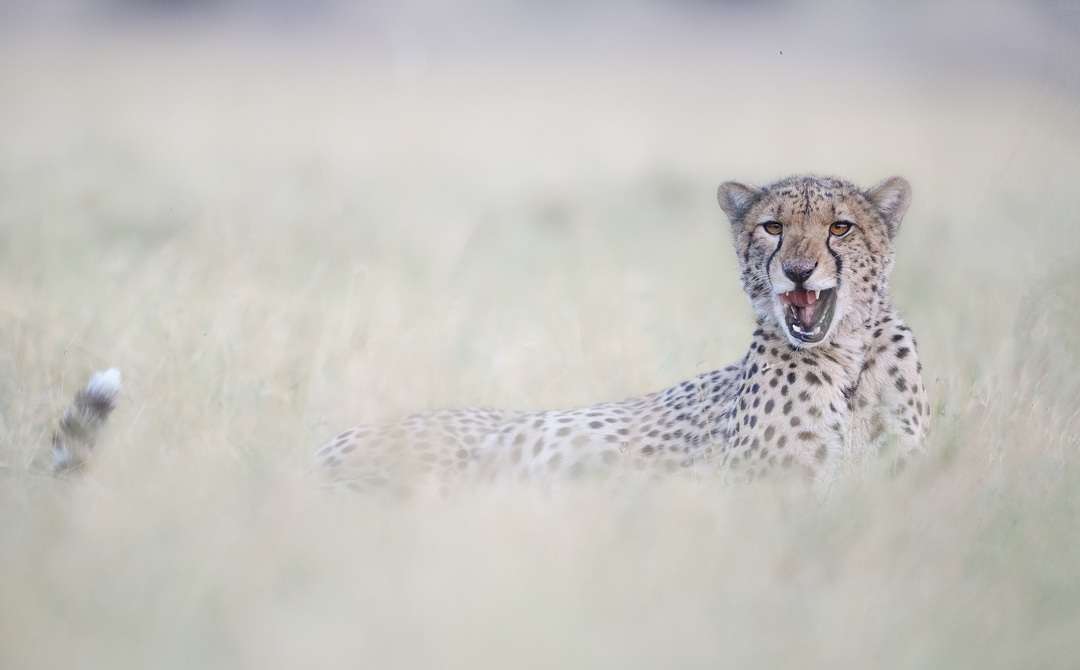
(Jacob) An amazing experience shared at Qorokwe was a sighting in which a pride of five lions hunted a giraffe calf approximately four months old. We started the morning drive early, and not even a kilometre from camp we spotted the pride, consisting of four females and one sub-adult male. My guest was a photographer, and we were blessed with soft light. We took our time following the pride of lions and making the most of our photographic opportunities. After an hour of following the lions, we spotted a journey of giraffe heading towards the pride. The bush was dense, so the giraffes didn’t spot the approaching lions; the wind direction also favoured the lions closing in. The lions slowly made their way to the giraffes until they were about 200 metres away, and then suddenly one of the giraffes saw them. A signal was sent to the rest of the journey, telling the lions that their presence had been noticed. The cats clumsily flopped to the ground, showing disinterest in the giraffes because they knew they had lost their element of surprise, critical for success in the hunt.
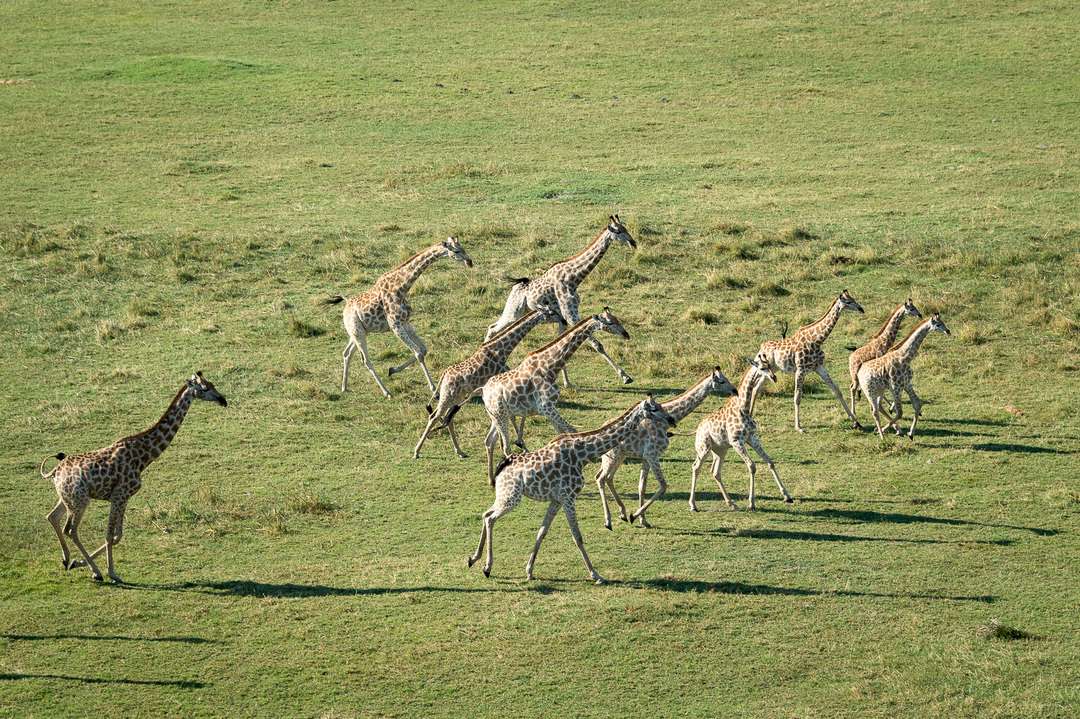
But as the giraffes trotted away, their hooves’ echoes inspired the lions to get up and do a cross-check, in case they had missed something. As the older giraffes ran off, the lions saw that a young calf had fallen behind its mother, it couldn’t keep up. I knew the hunt wasn’t over yet. My guest was very keen and wanted to experience some real action. I quickly manoeuvered and positioned the vehicle into the perfect spot.
The lions managed to catch the young calf by the neck, provoking the mother giraffe to charge, forcing them off her calf. But the neck bite was severe, and the injured calf struggled to keep up with its mother. The mother stopped running away from the lions and tried to protect her calf, but the determination and tenacity of the pride allowed them to stay focused on their mission. They now played games to see which one of them could scare the mother away. She managed to keep the lions at bay for a while, charging at each approaching lion until it was the next lion’s turn. Then she moved about 20 metres away, desperately trying to get her calf to follow her. The lions seized this opportunity to get hold of the calf again. The mother giraffe resumed her charge, attempting to kick the lions by throwing her front legs up in the air, which made them let go of her calf. Furious, the mother ran circles around her calf trying to keep the lions at bay. She threw another kick at one of the lions, but unfortunately it landed on her calf, which then lay motionless on the ground. The mother giraffe then had no option but to leave her calf and save herself.
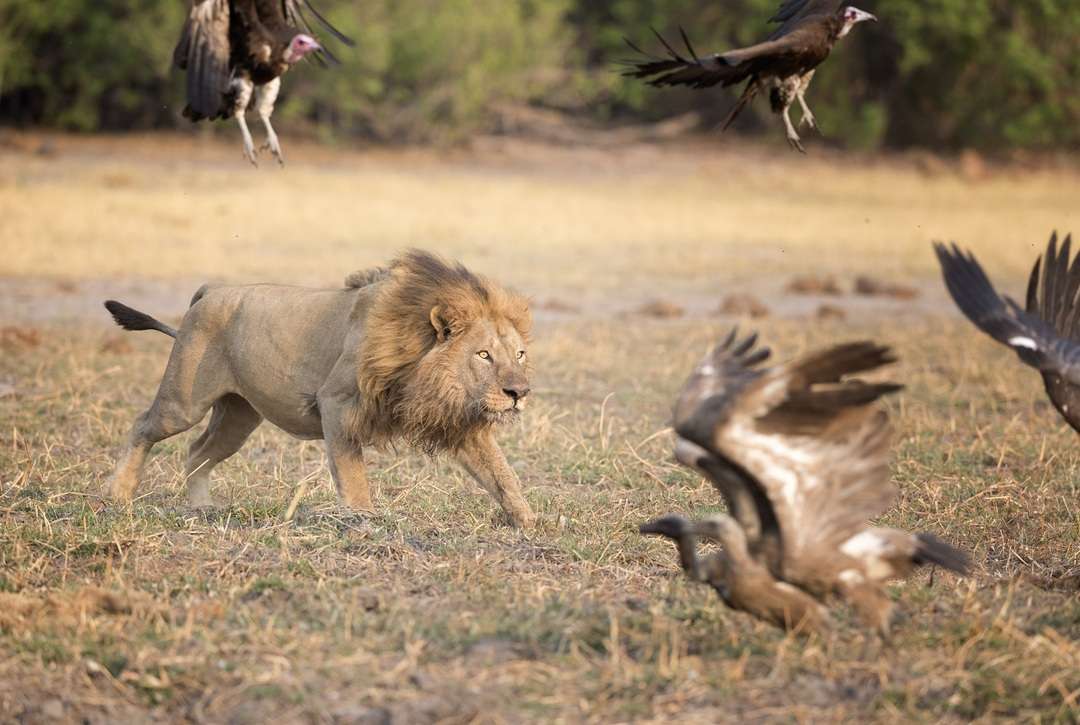
The entire experience lasted four hours, almost the whole duration of the morning drive. Though the mother giraffe gave up in the end, she stayed in close proximity and witnessed the lions devour her calf. It was very emotional but also breathtaking to experience such an event – the Qorokwe highlight for my guest and a story that went viral .
What are some of the key bird species that guests can expect to see?
(Tshabo) Water-based birds, because of permanent rivers. Also, the lilac- breasted roller; wattled crane; saddle-billed stork; and black coucal. During winter, we see the great white pelican. There are also many different vulture species, and, seasonally, osprey.
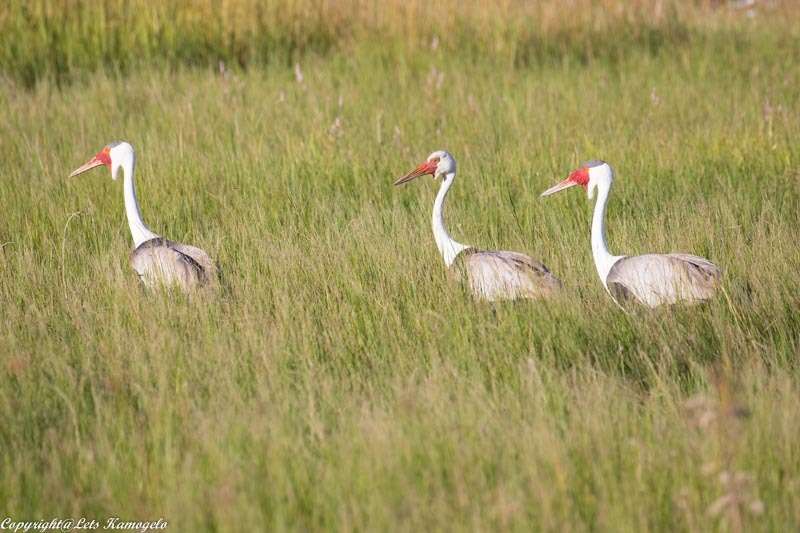
How does the Qorokwe experience compare to/differ from that of the WS camps in the Okavango? Would you recommend that guests visit Qorokwe plus other camps in the Delta?
(Cobus) Each camp has its own unique touches that make it special and different. Qorokwe should most definitely be combined with other camps within the Wilderness Safaris portfolio, to enhance a unique safari experience even more.
(Lesh) Yes, I recommend that guests visit Qorokwe and other camps in the Delta because all the camps are different in terms of vegetation and game sightings. Qorokwe offers about seven different habitats which include some species not found at the other camps.
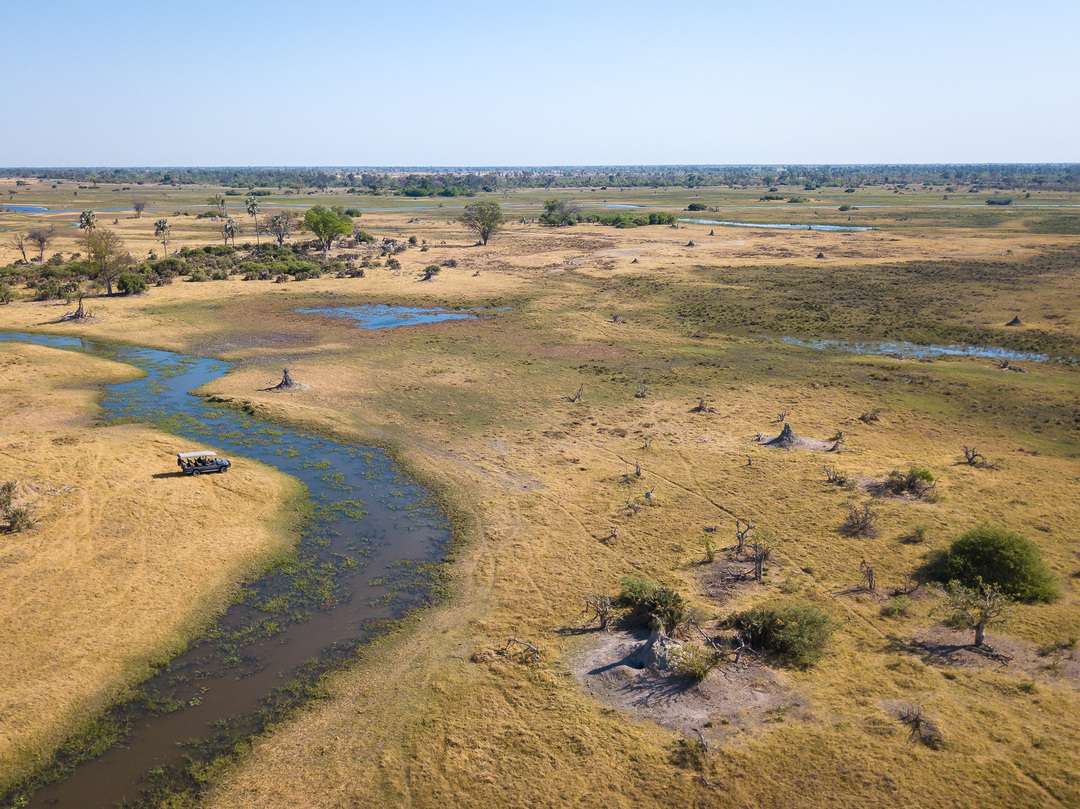
What’s your favourite time of day in/around camp and why?
(Lesh) My favourite time is early morning when the guests are having breakfast, because that’s the time most of the animals are having fun at the front of the camp – like the wild dogs, lions, and hippos.
(Jil) I love the late afternoon/early evening when the day draws to a close, the sun begins to set and lights up the bush in its golden hues. It changes the perception of colour of most animals and gives them a soft, warm glow.
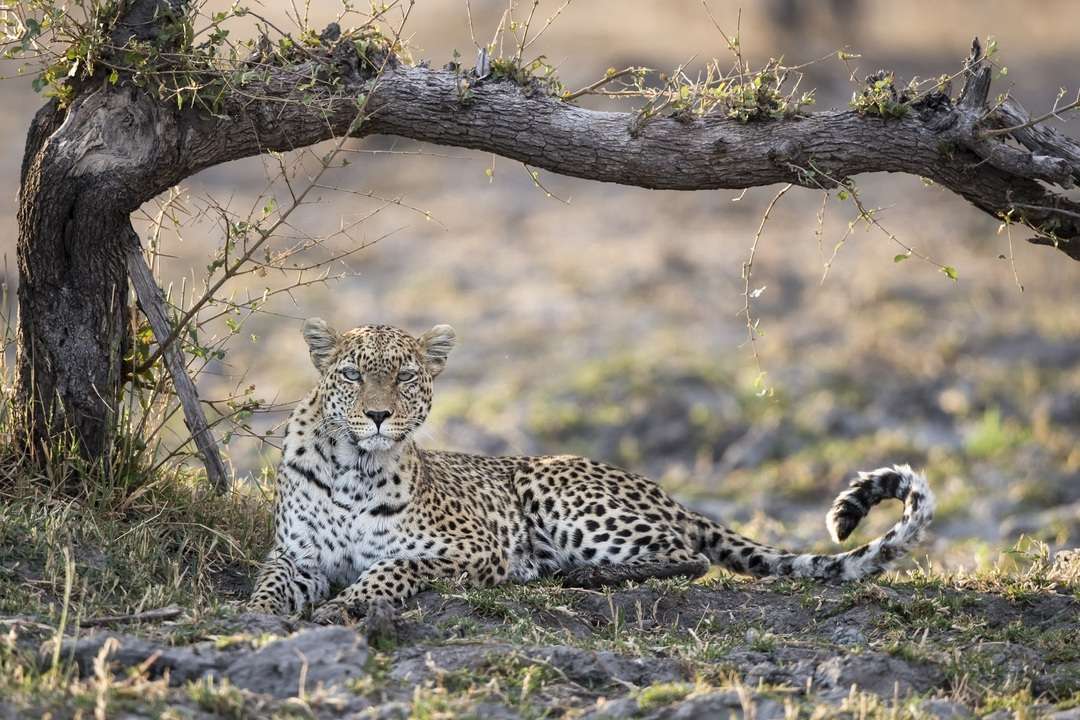
And your favourite season there? Please give us a sense of the difference between the seasons, in terms of landscape, weather, wildlife sightings etc.
(Lesh) My favourite season is winter because the landscape is dry, the grasses are not so thick so it’s easier to spot the animals from a distance; winter is the best time to do a bush walk freely. Guests can also go out on the activities without rains’ disturbance.
(Jil) I love summer because the bush is so lush, the colours so vibrant. The animals look healthy and vibrant, too; their coats seem almost cleansed from all the rain. And it is wonderful to observe all the baby animals recently born. The sound of the rain at night (and also in the day), often with beautiful thunderstorms, is amazing.
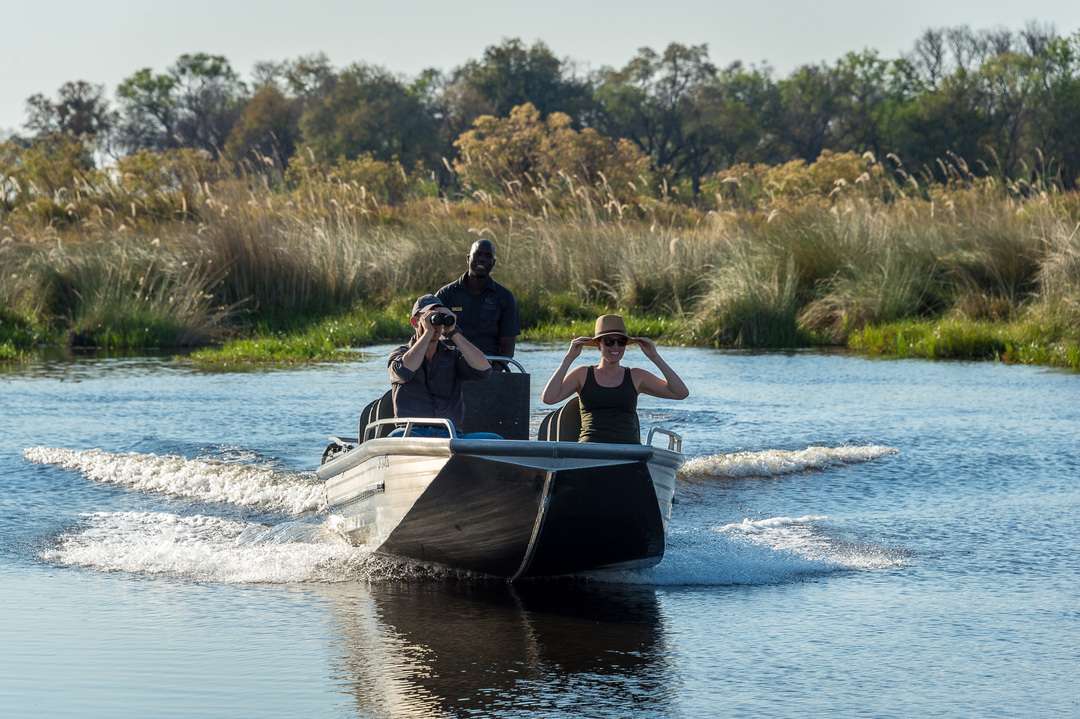
What kind of community and conservation work is Qorokwe doing/supporting in the Qorokwe/Okavango area?
(Cobus) We do all the community work within the area and villages of in the NG32 community. We built and successfully handed over a new kgotla (community court, council, or meeting place) structure in one of the villages. We sponsored beds for one village in conjunction with other companies operating within NG32. We helped with the maintenance of the bridges. We plough fields during the rainy season. We allow and support traditional means of living, like harvesting grass and fishing, within our concession. We accommodate people at certain times and help with the transport of various items. During the COVID-19 pandemic, we have supported the communities with essentials, sanitation and food parcels.
What items are essential for guests to bring while on safari there?
(Lesh) Their medical kits and sunscreen.
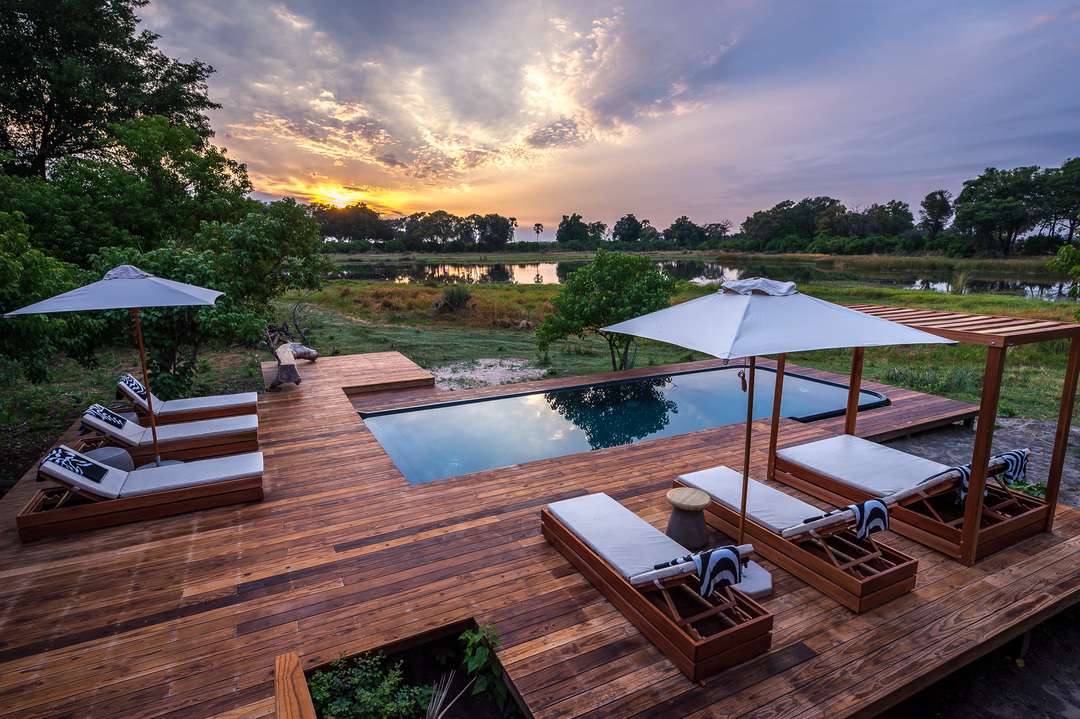
What are your favourite areas to visit around/in camp and why? Which spots are guests’ favourites? Which places are best for sundowners?
(Lesh) The Gomoti area, because it has a mixture of different animal species, making for sensational game viewing, and the landscape is amazing.
(Jil) I don’t have one favourite spot or area, but generally I am entranced by watching wildlife at any waterhole or river during sunset. As long as the backdrop contains water, with animals grazing, drinking, or playing as the sun is setting, I am spellbound and ecstatic.
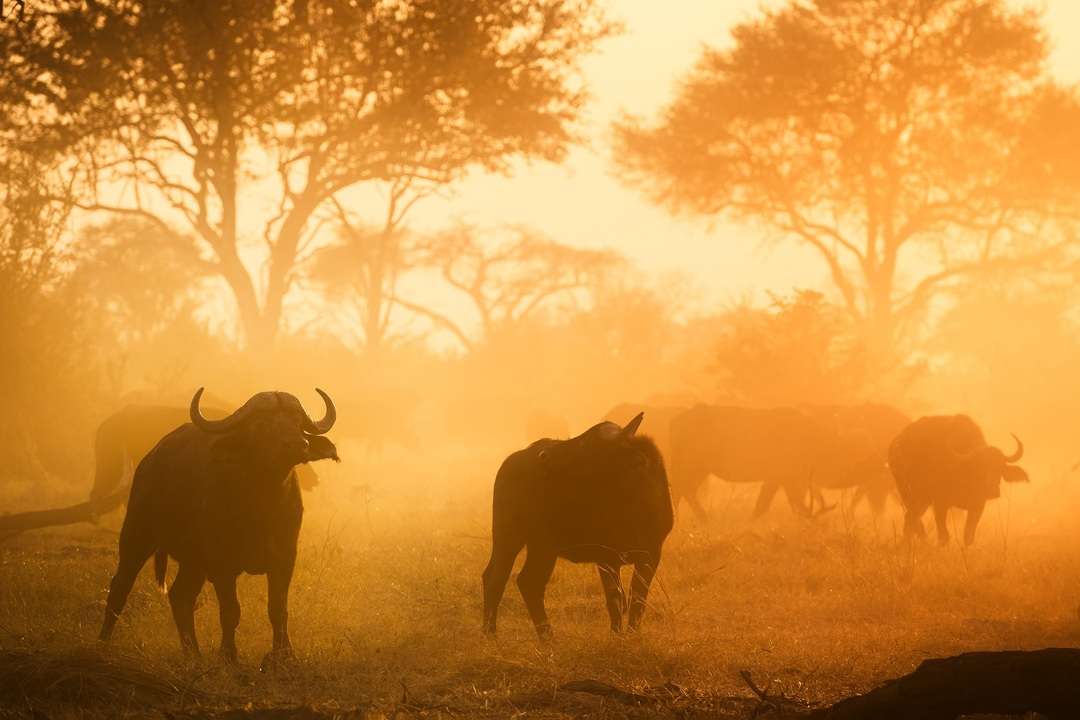
Please talk about the décor/design at Qorokwe, in the rooms as well as the common areas.
(Jil) I love that Qorokwe is so unique in itself and has a more modern design in architecture than is generally found in Botswana, especially with the (almost) flat roof and rather square design of the units, using materials (e.g. steel) that have never been used before in lodges (at least in Botswana) but align with our vision of sustainability.
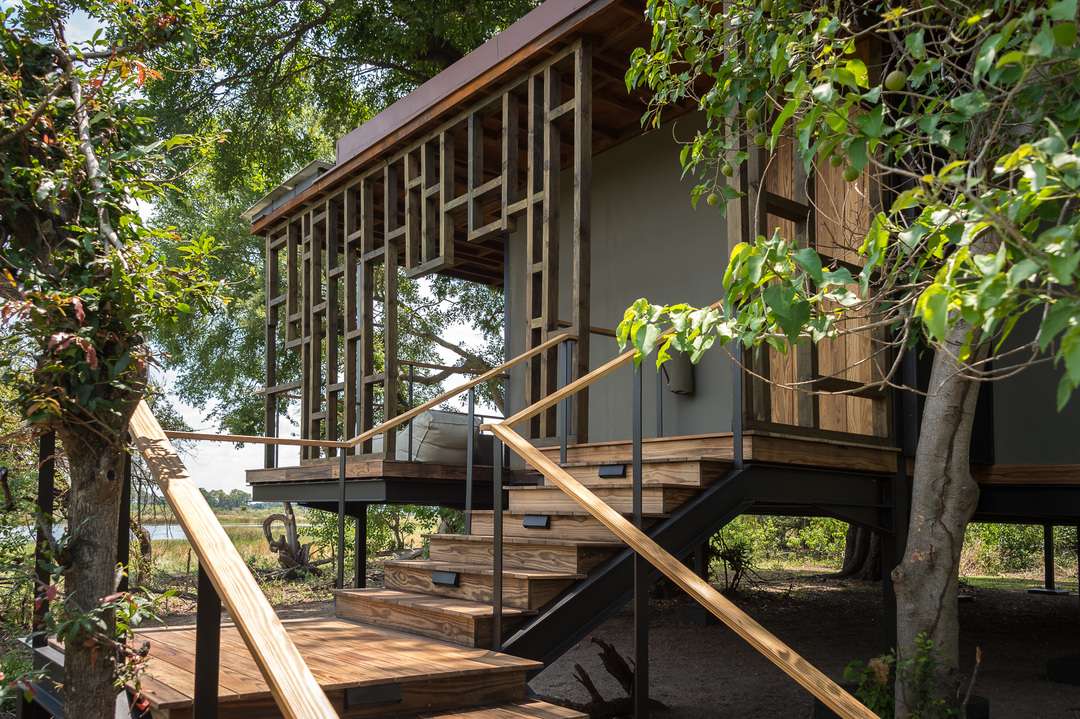
At the same time, the design and choice of colours, as well as materials, ensure that the camp does not seem out of place (or too modern) and that it blends in with its surroundings. Especially the main area’s openness makes you feel part of the bush, and the earthy tones used in the interior design, such as copper (like the red grass in winter), pale gold (like the grasses and sand), as well as brown (like the earth) create a warm and inviting atmosphere that balances the modern lines of the camp structure.
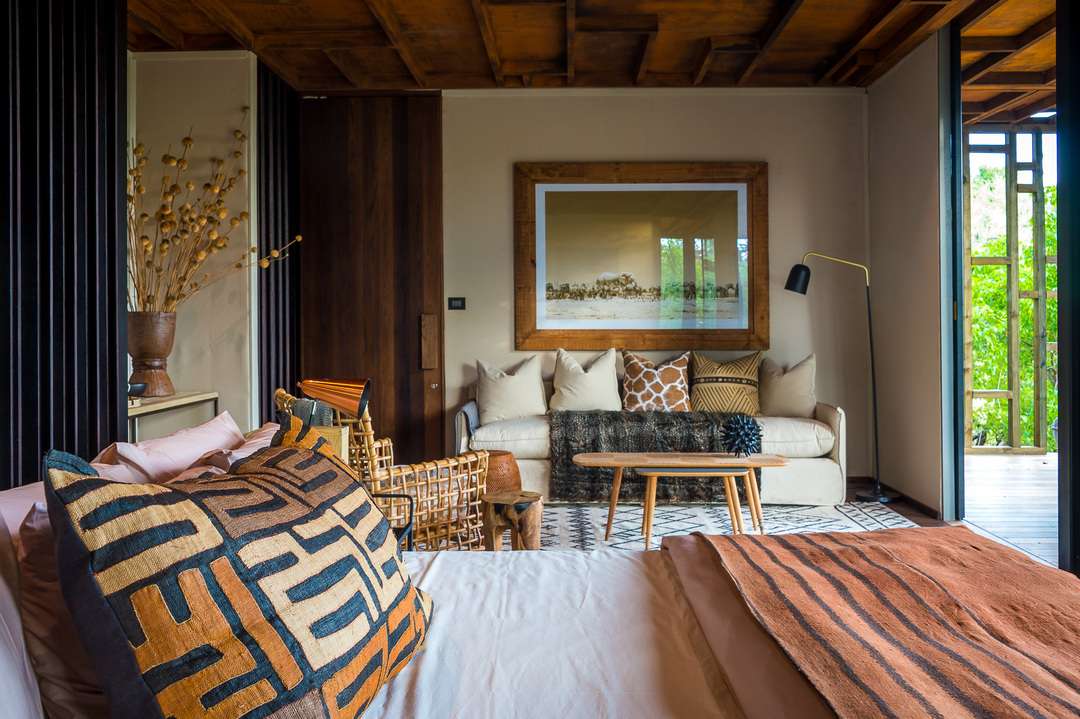
Guests have often commented that they loved the attention to detail in the design and architecture, as well as the more intricate features (a lot of the furniture has been custom-made for our camp) and the fact that Qorokwe Camp is so different to other camps in Botswana and specifically in the Okavango Delta.
Our family’s favourite places in the camp are either one of the pools – there is just something special about taking a dip and watching the wild animals.
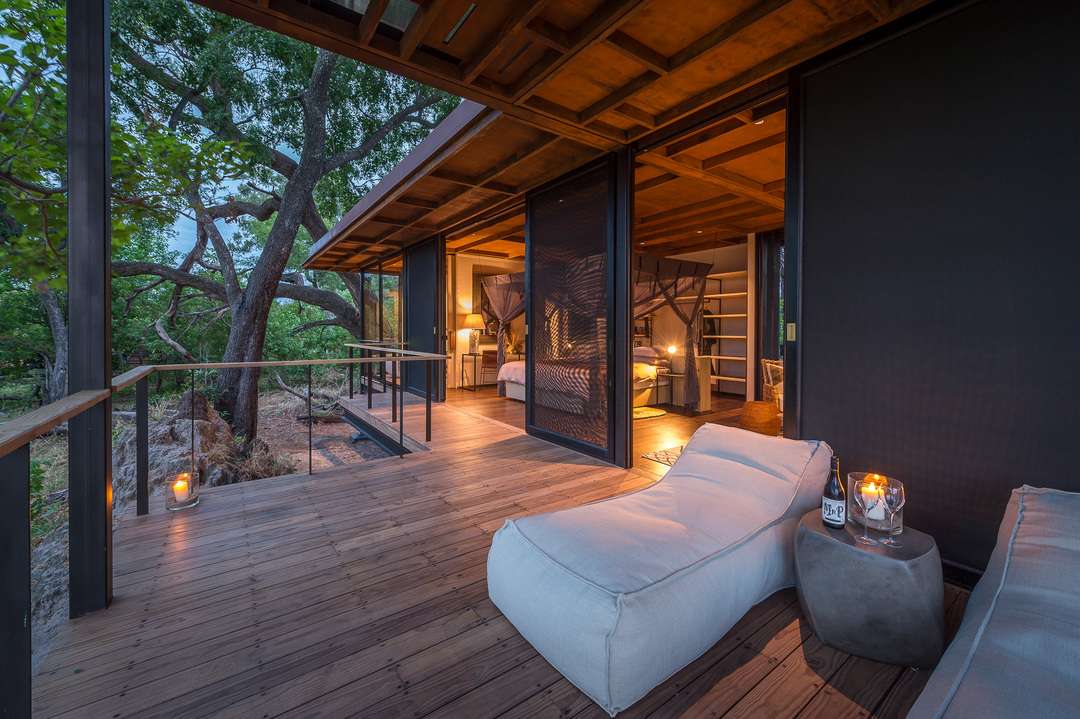
(Cobus) The choice of having a steel substructure was not made lightly. No one at the time used this method of building locally, so inadvertently we were the first to make the leap. It just made so much sense to erect something with such a long lifespan yet a minimal footprint that could later be dismantled and moved, leaving the environment basically untouched. The beautiful lagoon at camp that is filled with water lilies inspired the colour scheme throughout the camp. The ceilings were painted with a special paint and an activator was then added to create the rustlike look, making each room unique in colour. Small features make each little space unique from the next, like the skylight openings in the verandas letting in sun and light in a stunning array. The rooms were designed with three metre high ceilings in order to maximise the view: as you enter your room through the beautiful oak door, almost all you see is the view out to the lagoon. Your eyes are immediately drawn to the outside, where all the animal action takes place.
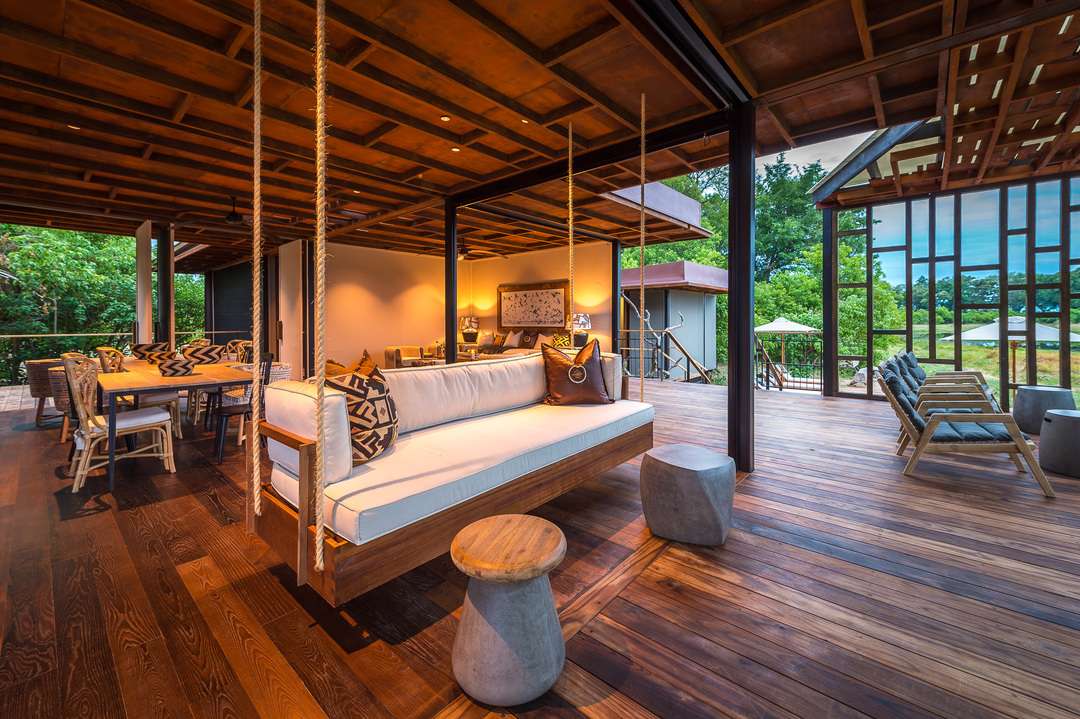
The rooms are extremely comfortable and modern, yet not too modern for the bush. The main area is cleverly placed so that you have a view over the distant floodplains and palm-filled islands, with the magnificent lagoon right at your feet. The boma area is down on the ground next to the lagoon. Many a guest relaxing or enjoying their breakfast has been surprised by wild dogs chasing down their prey just there, or by the grunting of the resident hippo pod visiting the lagoon when the seasonal waters arrive. The main area was very well thought through, with many spaces for guests to sit and enjoy their privacy if needed. Even with a full camp, one never feels that you are on top of your fellow traveller. Boma evenings are special, happy gatherings next to the glowing fire where guests are treated to song and dance from the surrounding villages.
The design and décor are almost always commented on by each guest visiting Qorokwe, and they all love the different feel. Guests generally concur that Qorokwe is distinct and modern, yet they feel at home.
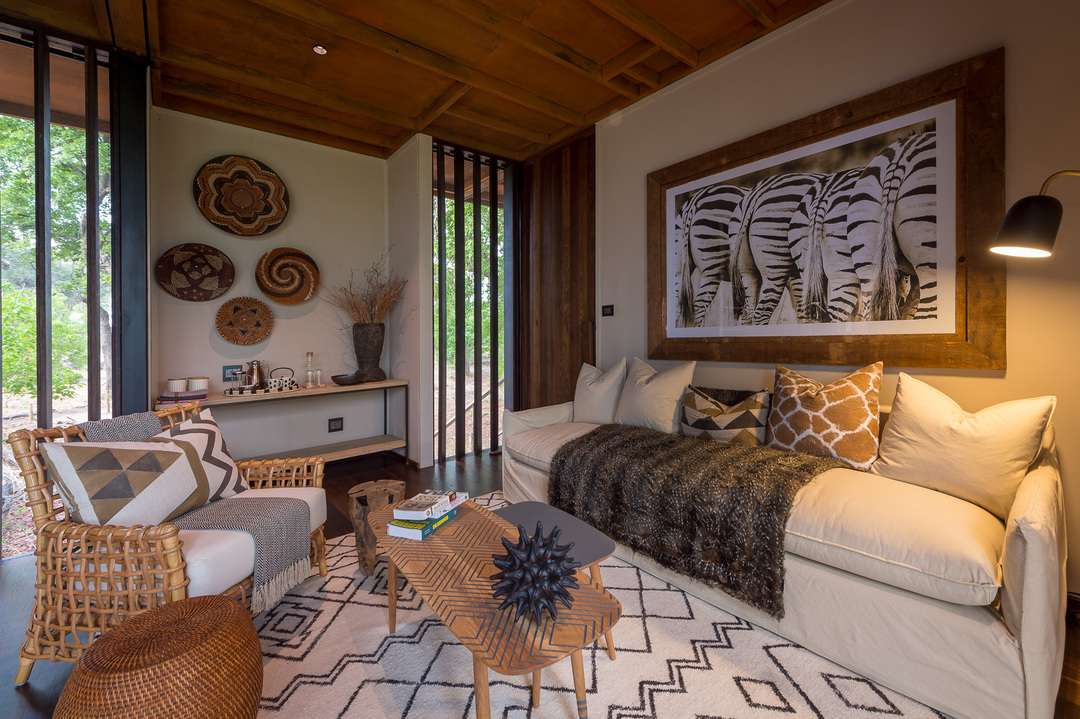
What is the dining experience at Qorokwe, and some highlights on the menu?
(Cobus) We provide both in-camp and out-of-camp dining experiences. In camp, we have a separate dining area with a wonderful, candlelit ambience. We can set up a very private dining experience down by the pool, if requested. We often organise a food activity at the Gomoti Channel, if guests are feeling adventurous; we most always see big game there.
We can also set up a ‘champagne drop’, mostly happening on a mokoro ride, when we surprise guests with a stopover to pop open a bottle of champagne hidden in the reeds. Boma nights are always popular, when staff dress in traditional outfits and sing and dance to local songs. There’s always a lot of fun and laughter on those occasions.
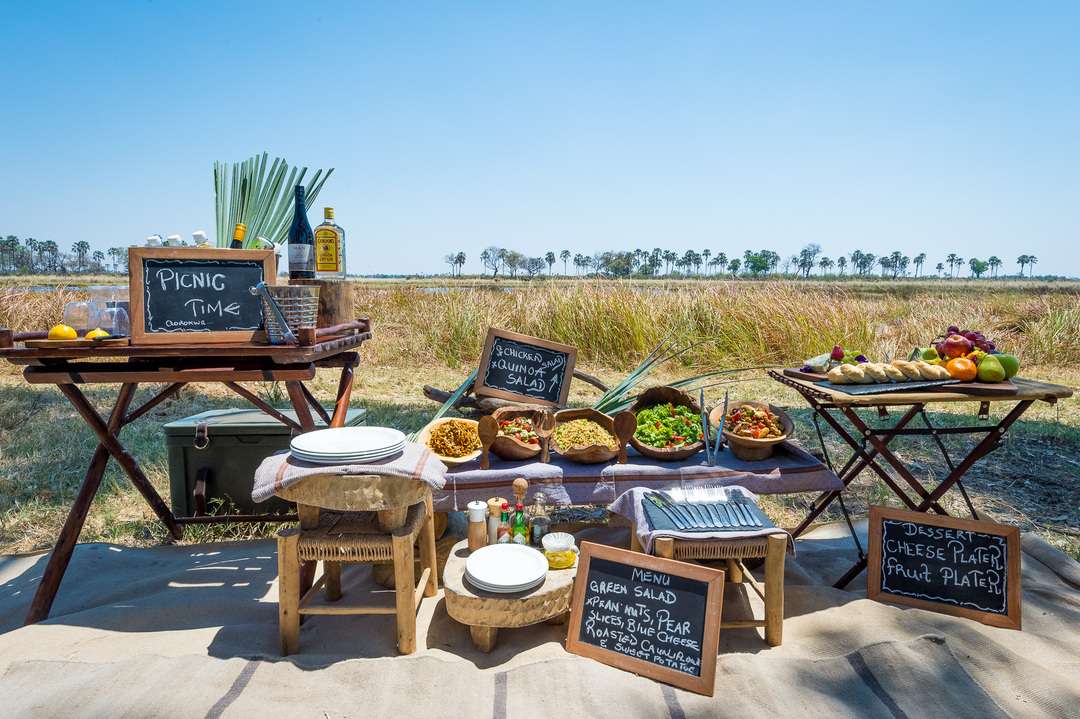
(Lesh) We offer tasty, healthy, mindful menus drawing from various cuisines, including local ones. Our menu changes regularly, and we always try to cater for different tastes, including vegan and vegetarian. One of our Qorokwe highlights is pounded beef; guests love it. We also have scrumptious dishes; for breakfast, French toast topped with caramelised bananas and ground nuts. Then later, roasted pumpkin quiche with caramelised onions, gorgonzola, and sage; mixed cheese fondue with parsnip truffle fries; coconut poached fish; Moroccan venison tagine; vegetable-loaded vegan korma; and white chocolate mousse and espresso sabayon with slow-roasted strawberries and chocolate shards. To accompany these dishes and others we offer a wide selection of fine wines and other beverages.
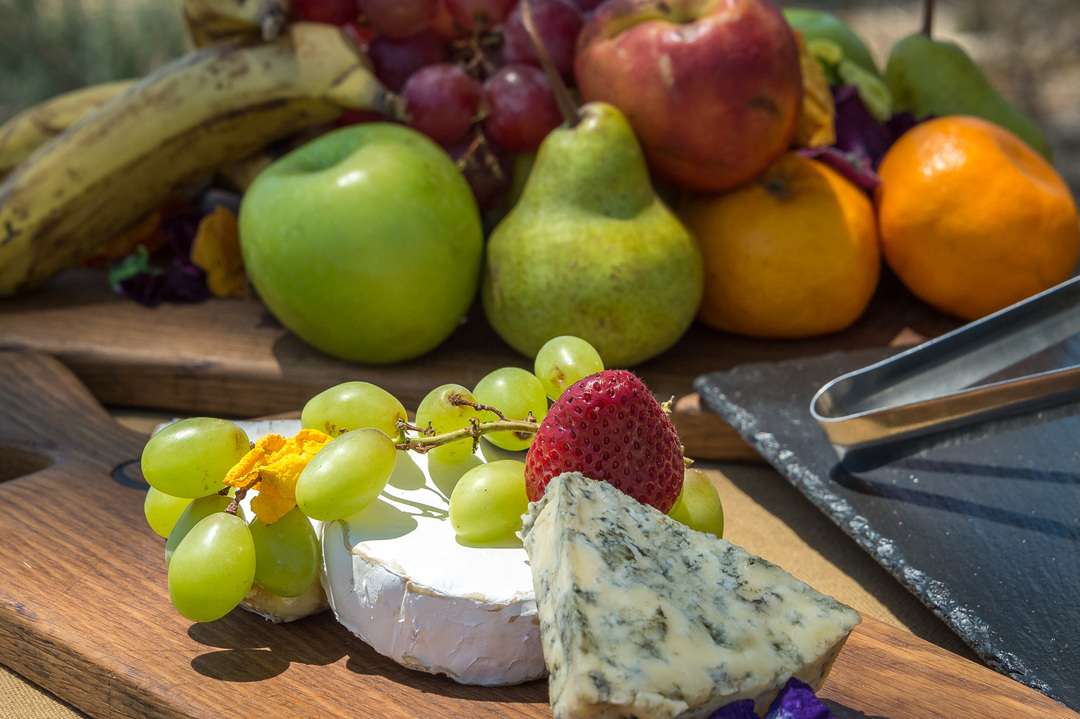
Does the camp have a signature cocktail?
(Lesh) Yes we do, here it is: Fill a highball glass with lots of ice and add double shots of lime cordial, double shots of sugar syrup, and half Dry Lemon, half lemonade, plus a splash of soda water. Garnish with a lemon slice and sprig of mint.
What makes you most proud of the camp, and working there?
(Lesh) The architecture of the camp is inspiring, and there is also a lagoon in front of the camp where hippos are always enjoying themselves. It is also a community camp, in that it helps people from local communities with employment that has greatly improved their lifestyles.
(Jacob) Guests at Qorokwe appreciate the kind gestures and dedication that the Qorokwe staff display in serving them. Guests also appreciate the staff’s positive attitude, and that is where the Qorokwe magic lies – together with being able to showcase guests amazing wildlife and experiences.

(Jil) I love the atmosphere created within camp – a serene, warm, and peaceful environment, which gets emphasised by the pride and teamwork of the managers and staff working there, as well as the guides who work in synergy to create the most epic game drives.
Who comprise the staff at Qorokwe? Please tell us a bit about their backgrounds, training, service, and relationships with guests.
(Lesh) When Qorokwe opened, staff went for training at Wilderness Safaris camps and Wilderness Safaris trainers also came to Qorokwe to train the staff. The company also has sent the staff like guides for training. The staff has a very good relationship with guests because we are very well trained, even though coming mostly from the rural areas.
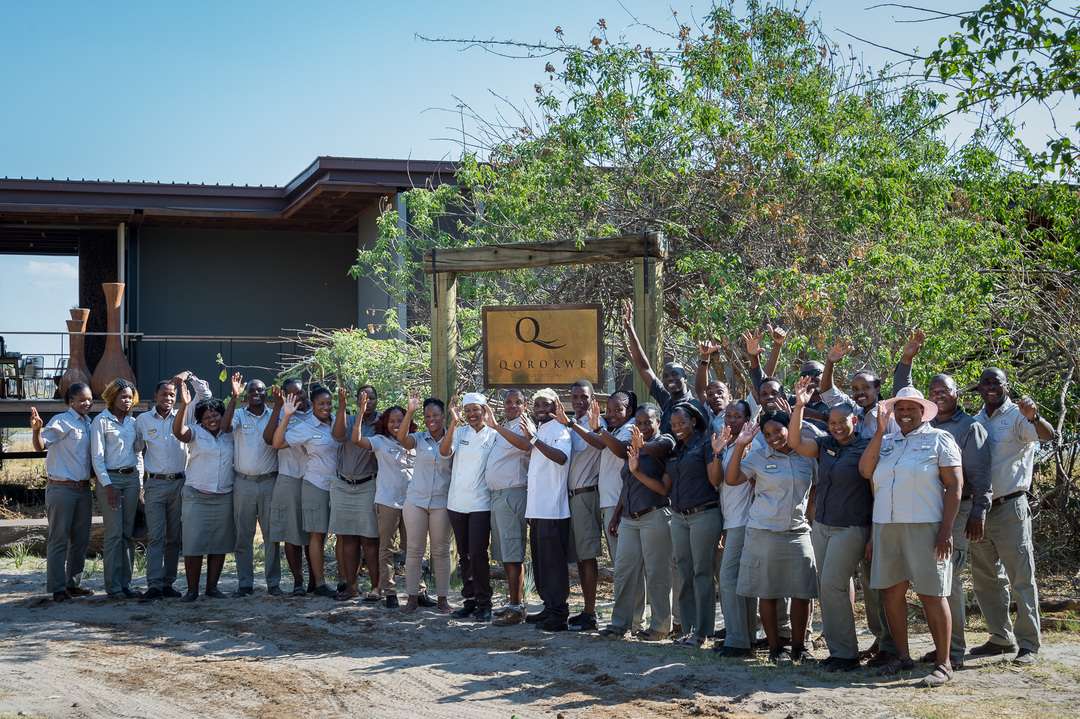
What feelings/impressions would you most like guests to take away with them?
(Lesh) Unforgettable memories that will make them come back for our amazing hospitality.
(Jil) A sense of peace, harmony, contemplation, and tranquility, as well as a feeling of ‘being one’ with nature and having reconnected with one’s roots.
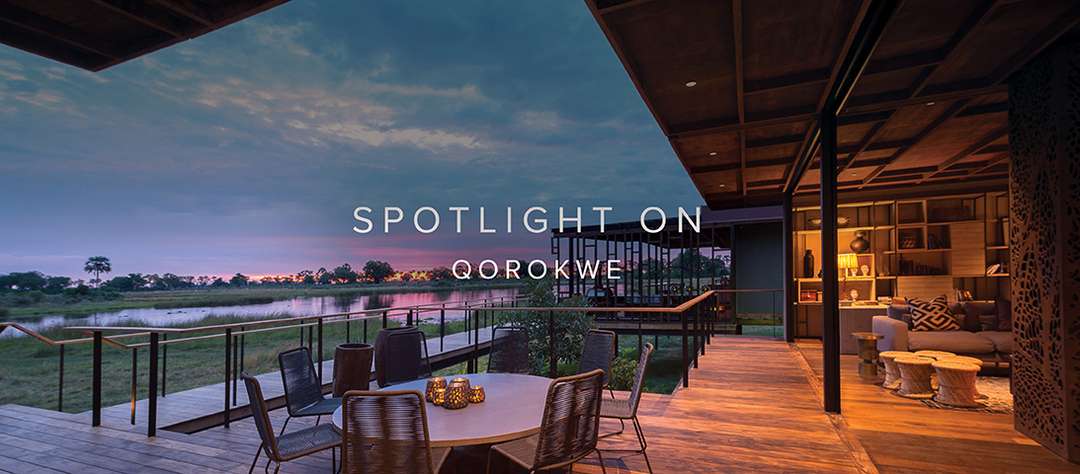
A Wilderness Safaris interview with Qorokwe staff:
- Cobus Calitz, General Manager andOwner
- Allan Monnaaletstatsi; Tshabo Mokobela; Jacob Pusetso Saobe, Safari Guides
- Lesh Italy, General Manager
- Jil Isabel Gerard-Calitz, Procurement Manager and Owner

Let’s plan your next journey
Ready?
When we say we’re there every step of the way, we mean it, literally. From planning the perfect circuit, to private inter-camp transfers on Wilderness Air, and easing you through Customs. We’re with you on the ground, at your side, 24-7, from start to finish. Ready to take the road less travelled? Contact our Travel Designers to plan an unforgettable journey.